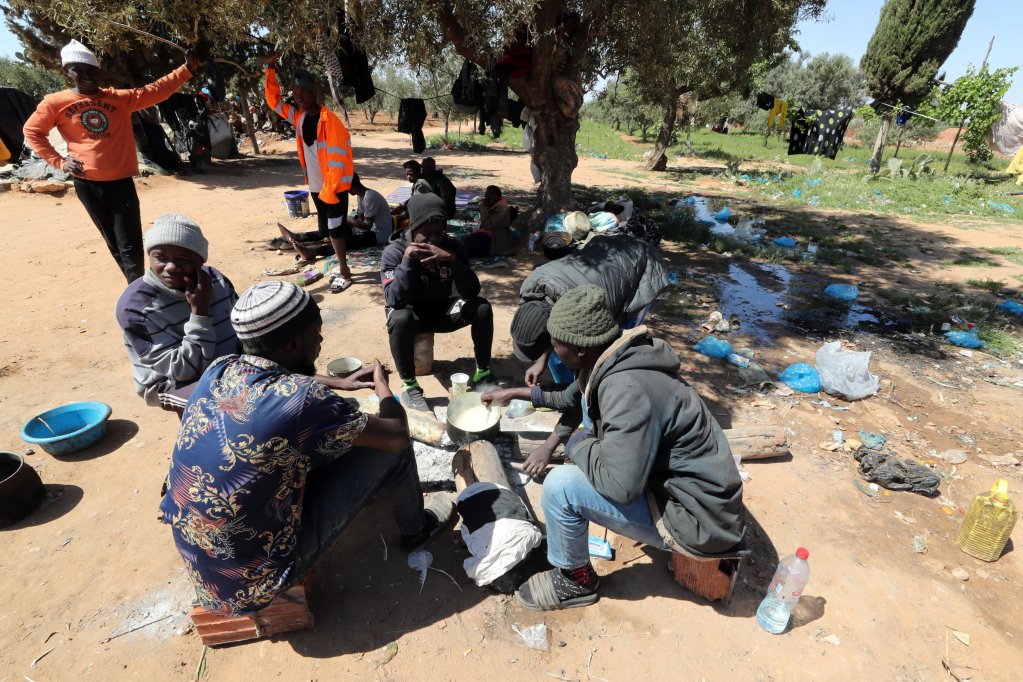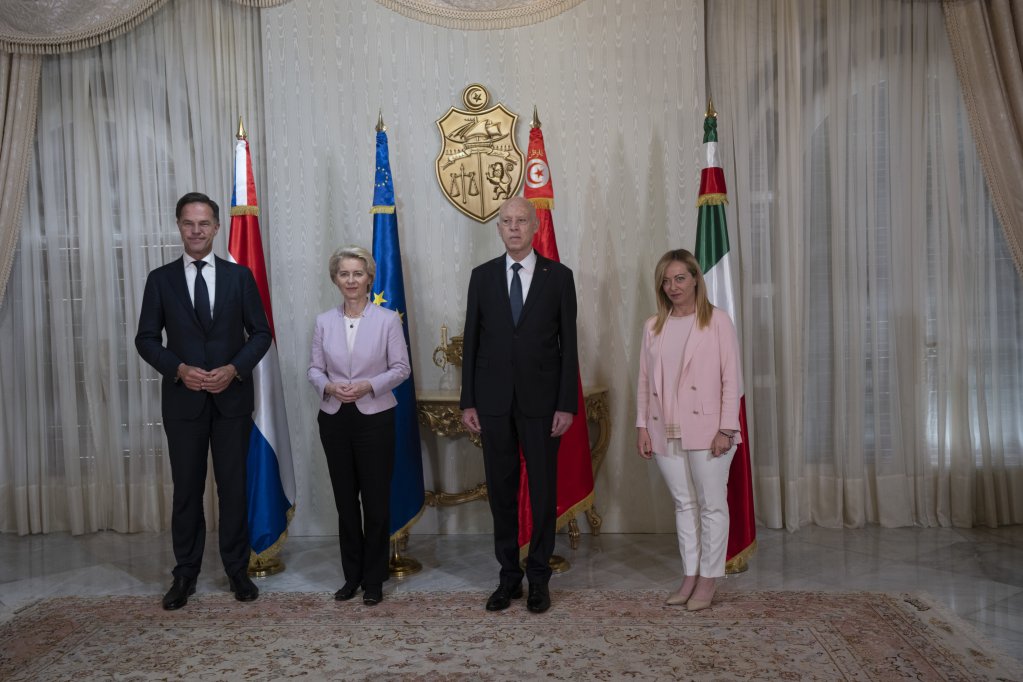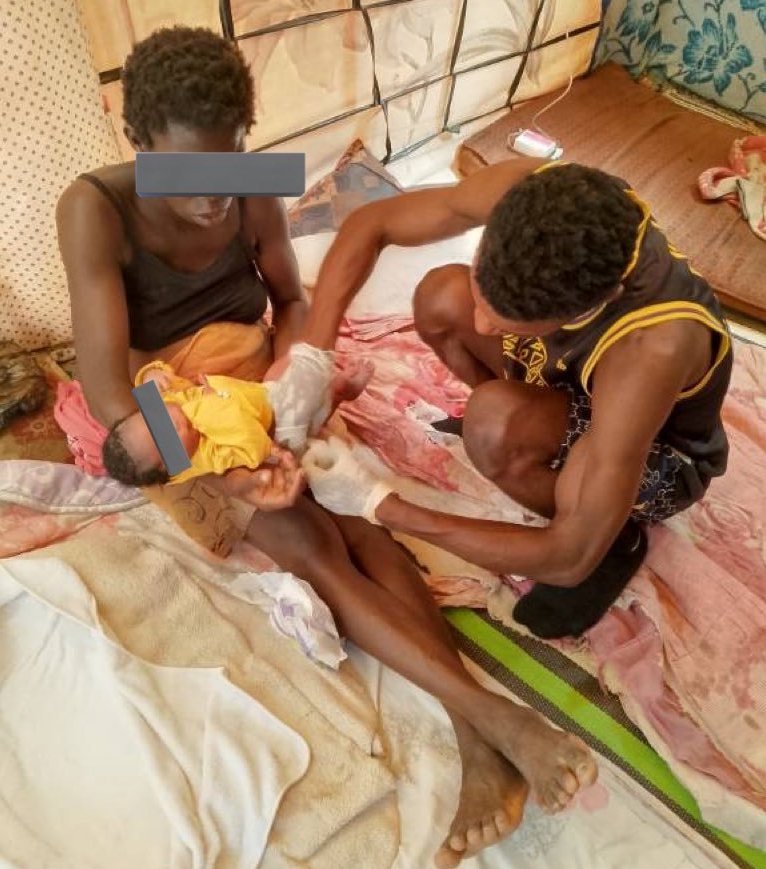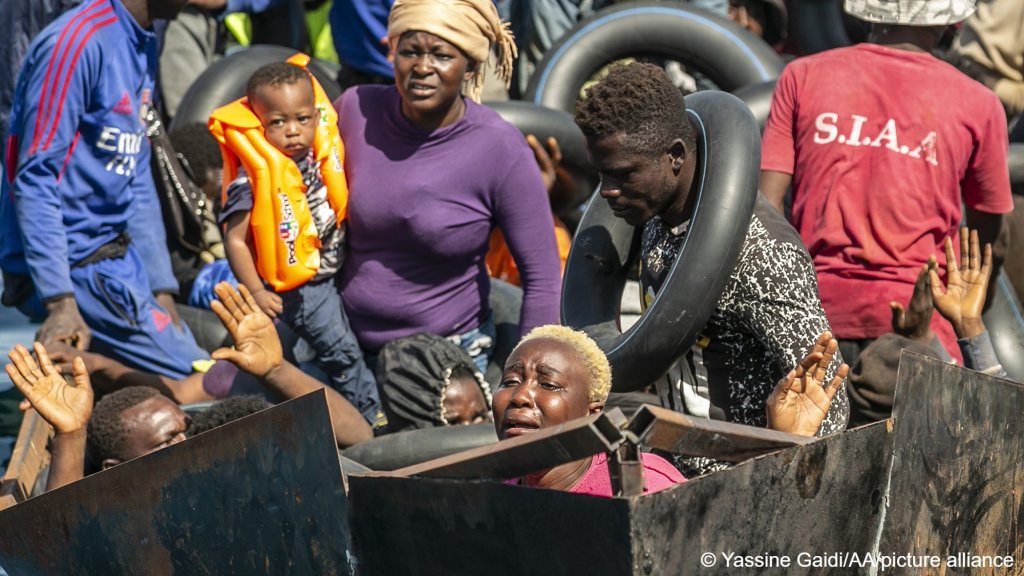The European Union has told Tunisia it expects the country to investigate allegations that migrants have been beaten and raped by police. The EU has a deal with Tunisia intended to prevent migration to Europe.
The European Commission is calling on Tunisia to investigate allegations of abuse against Black African migrants. Lawyers and families of jailed Tunisian opposition leaders are also calling on the International Criminal Court to investigate alleged Tunisian crackdowns on the opposition ahead of October’s presidential elections.
This is the second time that Tunisian opposition members have sought a probe via the ICC.
"The new evidence shows that Black African migrants are facing brutal and heartless treatment at the hands of the Tunisian authorities," said a lawyer for the opposition, Rodney Dixon, in a statement on Tuesday (September 24).
"The ICC has the jurisdiction to investigate these alleged crimes against humanity and should act with the full force of international law to protect those most vulnerable," he added.
Also read: 38 migrants arrested after clashes with coast guard in Tunisia
Allegations of arbitrary arrest, mistreatment and abuse
The statement went on to say that "countless migrants report similar experiences of arbitrary arrest on land or at sea, followed by collective expulsion to desert regions along the border with Algeria and Libya, while being beaten, mistreated, and suffering psychological abuse."
The ICC confirmed it had received the request. The court is already investigating similar claims of abuse against migrants in Libya. The claims include "arbitrary detention, unlawful killing, enforced disappearances, torture and sexual and gender-based violence."
Previous UN, human rights organizations and Council of Europe reports have found evidence of these kinds of allegations in Libya.
Last week, Britain’s Guardian newspaper printed the latest investigation into allegations of "widespread sexual violence" perpetrated against migrants, particularly migrant women in Tunisia. Conditions for many Black African migrants in Tunisia are described as "horrific," noted the report.
Also read: Migrants in Tunisian camps suffer machete wounds and untreated illnesses

'So many cases of violent rape and torture'
Written by a reporter based in Sfax, the investigation alleged that the attacks had increased along with the numbers of migrants being blocked in Tunisia from crossing the Mediterranean to reach Europe.
One woman, named as Marie* from Ivory Coast, told the reporter, "her voice wobbling," how she had come across four officers from Tunisia’s national guard, charged with controlling migration, and benefiting from EU money to do so. Marie said she sensed the situation might turn ugly. "It was clear they were going to rape me."
Luckily for Marie, her screams alerted a group of Sudanese migrants, who ran to help her, and the national guard officers allegedly retreated to their patrol car.
Yasmine, a healthcare worker in Sfax, told the Guardian that she believes hundreds of migrant women have been raped by members of the Tunisian security forces over the last 18 months. "We’ve had so many cases of violent rape and torture by the police," she said.
Funded by Europe
The people being accused of carrying out the attacks are often Tunisians, in many cases members of the police forces, national guard and security services. These forces are all being funded by the European Union, after the latest deal was struck last year between the EU and Tunisia.
A European Commission website about Tunisia details the history and amounts of funding flowing between Europe and Tunisia. Last year, in July 2023, 150 million euros was pledged by Commission President Ursula von der Leyen and the Italian Prime Minister Giorgia Meloni. But, as the page notes, EU-Tunisia relations and funding and development aid go back to 1976.

When the Memorandum of Understanding was signed last July, the money was intended to stabilize Tunisia’s macro-economic situation, improve its public finance management and its business and investment climate. 105 million euros was destined for migration: "Reinforcing the ongoing cooperation in the areas of border management, anti-smuggling," as well as "protection and access to basic services for refugees and asylum seekers in Tunisia, assisted voluntary return from Tunisia to countries of origin and reintegration of Tunisia returnees, as well as legal migration."
All in all, for the period 2021-2027, EU assistance to Tunisia is slated to amount to 620 million euros. In the period since 2011, EU assistance to Tunisia has "amounted to 3.4 billion," according to the Commission.
Also read: Majority of migrants in Tunisia are aiming for Europe, suggests research
Managing migration
Between 2017 and 2020, the European Union Emergency Trust Fund for stability provided a total of around 200 million euros to Tunisia to help manage migration and support a "holistic approach comprising migration governance, border management, protection, fighting smuggling and trafficking, labor migration and legal mobility, diaspora mobilization, return, readmission and reintegration."
On Tuesday, (September 24), a European Commission spokesperson told reporters that "where there’s any allegations of wrongdoing concerning their security forces, then of course, as partners of Tunisia, we would expect them to duly investigate these cases."
Allegations of mistreatment of and racism towards migrants in Tunisia, in particular Black African migrants, are regularly brought. Last week, the group Refugees in Libya, whose founder David Yambio is now based in Italy, says they have documented thousands of cases of migrants being mistreated in both Libya and Tunisia.
They say hundreds of migrants are now living in olive groves outside the Tunisian port town of Sfax, a major jumping off point for migrants towards Europe, and that serious illnesses, such as cholera or typhoid are breaking out in the camps where there is no access to sanitation or drinking water.
'Increasingly violent climate'
Refugees in Libya describe an "increasingly violent climate" for migrants in Tunisia. InfoMigrants recently spoke to a man, Ibrahim, from Sierra Leone who explained that he used to be an anesthetist in his own country. He is the only doctor present in the camp. With the help of five nurses, he tries to treat as many migrants as he can.

"The only two medical instruments I have are a stethoscope and a blood pressure monitor," Ibrahim explained to InfoMigrants. He walks between the camps, trying to help as many as possible. He says in his time working in the camps since January, he has seen more and more people injured with machetes. "Here, if you are a Black sub-Saharan, you cannot walk alone."
Ibrahim admits that many of the camp’s inhabitants carry machetes. Some of the wounds are inflicted by Tunisians, others happen in inter-camp clashes. One young man told InfoMigrants it was an "untenable security situation," because "more and more migrants are arming themselves with a machete to defend themselves from a potential attack." He believed around 70 percent of the camp’s inhabitants own a machete.
Also read: Italian NGO claims it has video 'proof' of migrant deportations to desert
Reducing arrivals to Italy
Italy’s successive governments have long been at the forefront of cooperation between Europe and Tunisia. The current right-wing government, led by Prime Minister Giorgia Meloni has credited those deals with helping them reduce the numbers of boat arrivals in Italy. In 2023, the majority of migrants attempting to cross the Mediterranean left Tunisia.
In 2024, the Italian government claims it has reduced the numbers of arrivals, compared to the same period the previous year by over 60 percent. However, when the current government took office at the end of 2022, the numbers of arrivals in Italy by boat, more than doubled compared to the year previously. So, critics point out that the Italian government has really just brought back the numbers of arrivals to a more stable number in years prior to 2022.

Rights groups like Human Rights Watch have said that agreements with Tunisia mean that more and more migrants are facing violence and arbitrary detentions. HRW says it has also documented abuses by the Tunisian coast guard, including beating people and leaving them adrift, reported the French news agency Agence France Presse (AFP).
Investigation findings expected in coming weeks
Now the European Union’s Ombudsman has opened an investigation into how the commission intends to ensure that human rights are respected under the EU-Tunisia agreement. The findings from the investigation are expected in the coming weeks.
In May, the EU conceded that its deals with Tunisia, as well as Morocco and Mauritania, had put it in a difficult situation, after numerous media investigations pointed to allegations that authorities in these countries were dumping migrants in the desert and using the bloc’s funds to do so.
The EU’s spokesperson Ana Pisonero underlined that "migration management has to be done in compliance with human rights," adding: "There’s international obligations on this and we expect our Tunisian partners, as the rest of our partners, to comply with these."
*The name has been changed to protect anonymity.
With AP and AFP
